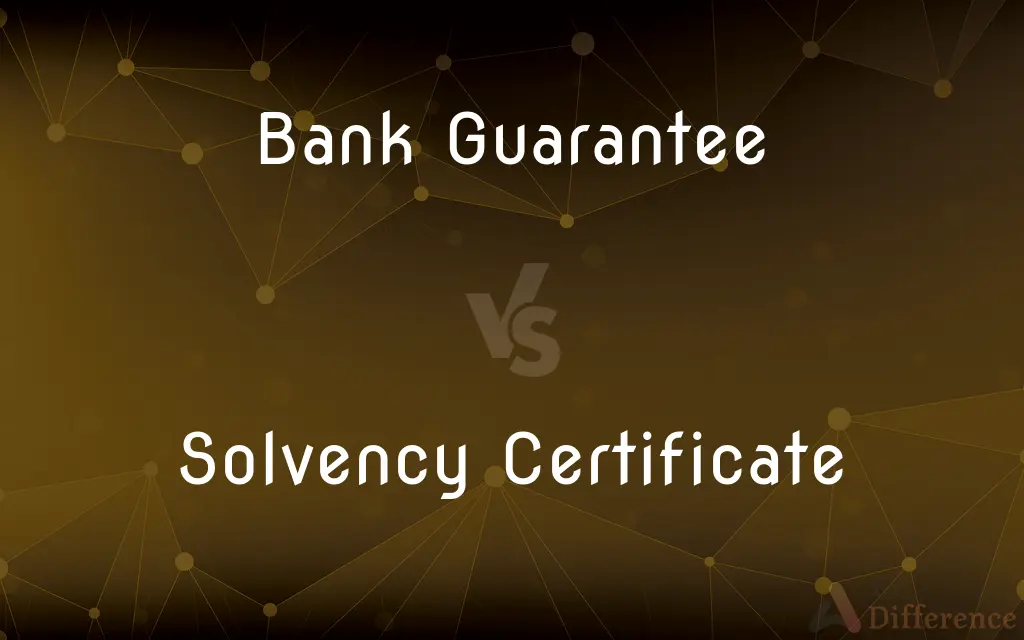Bank Guarantee vs. Solvency Certificate — What's the Difference?
By Tayyaba Rehman — Published on October 24, 2023
A Bank Guarantee is a bank's commitment to cover a loss if a borrower defaults; a Solvency Certificate proves a company’s financial stability.

Difference Between Bank Guarantee and Solvency Certificate
Table of Contents
ADVERTISEMENT
Key Differences
The Bank Guarantee and Solvency Certificate are distinct financial instruments serving different purposes within the business and financial domains. A Bank Guarantee is essentially a promise made by a bank to a third party that it will cover the loss, up to a specified amount, in case the bank's client fails to meet their contractual obligations. It acts as a safety net for the third party, providing assurance and mitigating risk involved in business transactions.
On the other hand, a Solvency Certificate is a document that attests to the financial stability and creditworthiness of an individual or a company. It is usually required when a business is bidding for a project, negotiating contracts, or seeking loans, helping to validate the entity’s ability to meet financial commitments. The Solvency Certificate essentially affirms that the entity in question is financially sound and capable of fulfilling financial obligations.
While a Bank Guarantee serves to indemnify the beneficiary against the risk of the principal debtor's failure to meet obligations, a Solvency Certificate serves as a testament to the financial health and reliability of a business or an individual. The Bank Guarantee is more about securing the interests of the third party in a contractual agreement, whereas the Solvency Certificate is about establishing financial credibility and stability of an entity.
In essence, both Bank Guarantee and Solvency Certificate play critical roles in the financial and business sectors. They act as crucial financial tools facilitating smooth, secure, and credible business transactions, albeit in different ways, with the Bank Guarantee providing a sort of financial assurance to third parties, and the Solvency Certificate acting as a proof of financial stability and integrity.
Comparison Chart
Purpose
To assure a third party that losses will be covered by the bank if a client fails to meet obligations.
To attest to the financial stability and creditworthiness of an individual or company.
ADVERTISEMENT
Usage
Used in business transactions to mitigate risk for the third party.
Required when seeking loans, negotiating contracts, or bidding for projects.
Nature
It is a commitment by the bank to cover a loss.
It is a document that proves financial stability.
Beneficiary
The third party in a transaction is the beneficiary.
The individual or company seeking to prove their financial stability is the beneficiary.
Implication
It provides a safety net to the beneficiary against potential losses.
It implies that the entity is financially sound and can meet its financial commitments.
Compare with Definitions
Bank Guarantee
Bank Guarantee provides assurance to the third party in contractual agreements.
Securing a Bank Guarantee, we reassured the contractor of our financial credibility.
Solvency Certificate
It is a certificate that validates the financial integrity and stability of a business or an individual.
To bid for the project, we needed to submit a Solvency Certificate proving our financial reliability.
Bank Guarantee
It is a financial instrument that safeguards the interests of the beneficiary in an agreement.
To finalize the deal, we obtained a Bank Guarantee for the client’s peace of mind.
Solvency Certificate
Solvency Certificate is required when seeking loans or negotiating contracts to establish financial credibility.
Obtaining a Solvency Certificate, we were able to successfully negotiate the contract terms.
Bank Guarantee
It is a promise made by a bank to a beneficiary to cover a specific amount of loss.
Our Bank Guarantee ensured the landlord of our ability to pay the rent.
Solvency Certificate
It affirms that the entity in question is capable of fulfilling financial commitments and is financially sound.
The Solvency Certificate we provided was instrumental in securing the loan.
Bank Guarantee
A Bank Guarantee is a commitment by a bank to cover a third party’s loss if the bank's client defaults.
The supplier required a Bank Guarantee to mitigate the risk of non-payment.
Solvency Certificate
A Solvency Certificate is a document that attests to an entity’s financial stability and ability to meet financial obligations.
We provided a Solvency Certificate to demonstrate our financial soundness to the lenders.
Bank Guarantee
Bank Guarantee serves as a risk mitigation tool in business transactions.
A Bank Guarantee protected the vendor in case we failed to fulfill the contract terms.
Solvency Certificate
Solvency Certificate serves as proof of financial health and creditworthiness of an individual or company.
The Solvency Certificate was crucial in establishing our credibility during the contract negotiations.
Common Curiosities
What does a Solvency Certificate represent?
A Solvency Certificate represents proof of an entity’s financial stability and capability to meet its financial obligations.
In what scenarios is a Bank Guarantee used?
Bank Guarantees are often used in business transactions to mitigate risks for the third party involved, such as in contracts and trade agreements.
What is the purpose of a Bank Guarantee?
A Bank Guarantee serves to assure a third party that the bank will cover losses if the client fails to meet contractual obligations.
How is a Solvency Certificate obtained?
It is typically obtained from a financial institution or a chartered accountant, who assesses the entity’s financial stability before issuing the certificate.
Is a Solvency Certificate legally binding?
While it’s not legally binding, it is a legitimate document provided by credible institutions or individuals, attesting to an entity's financial stability.
Who typically requires a Solvency Certificate?
Businesses or individuals may need a Solvency Certificate when bidding for projects, negotiating contracts, or seeking loans to prove their financial stability.
How does a Bank Guarantee benefit the beneficiary?
It acts as a financial safety net for the beneficiary, providing assurance against potential losses due to the principal debtor's failure to meet obligations.
Can a Bank Guarantee be revoked?
Generally, a Bank Guarantee can only be revoked under mutually agreed upon circumstances outlined in the terms and conditions of the guarantee.
What information is included in a Bank Guarantee?
It usually includes details of the contractual relationship, the amount guaranteed, expiration date, and terms and conditions under which the guarantee can be invoked.
Share Your Discovery

Previous Comparison
Black Chia Seeds vs. White Chia Seeds
Next Comparison
Electron Geometry vs. Molecular GeometryAuthor Spotlight
Written by
Tayyaba RehmanTayyaba Rehman is a distinguished writer, currently serving as a primary contributor to askdifference.com. As a researcher in semantics and etymology, Tayyaba's passion for the complexity of languages and their distinctions has found a perfect home on the platform. Tayyaba delves into the intricacies of language, distinguishing between commonly confused words and phrases, thereby providing clarity for readers worldwide.












































